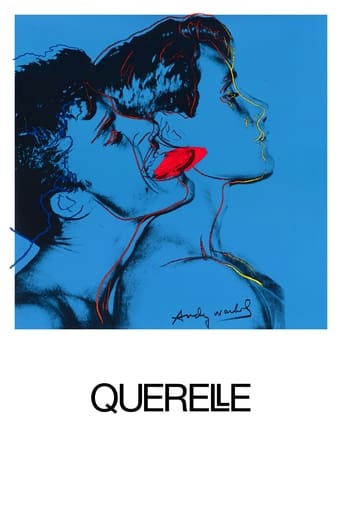sunheadbowed
Fassbinder's swan song takes everything to the extreme. So much so that critics have never quite been able to stomach it.'Querelle' is such a stunning work of art on several levels: the Navy dockyard set with its near-sepia hazy opiate yellows and browns (contrasting against the colour of the sailors' outfits, the brilliant whiteness a parody of purity), evoking both sickness and a perpetual dusk of hard-ons, repression, indulgence and violence; the cinematography, some of the best in any Fassbinder film, capturing the actors' reflections in mirrors as the camera coolly observes the lovers they talk to (or 'at') -- lust in an impenetrable frame in which no one can be satisfied and everyone has their own agenda; the incredible erotic sexual ambiance that manages to be both appealing and threatening; the acting (Davis clearly finds this unsubtle role liberating after working in the very gay yet very homophobic world of Hollywood). I find more to enjoy in this film every time I view it.The critics got it wrong here; perhaps a little too much sodomy for their bourgeois tastes? Let's see.. it has Brad Davis shirtless and sweaty in almost every scene (the one in which he's covered in oil and grease has to be the money shot); it features Jeanne Moreau being dramatic and elegant and making statements about men's 'pricks' (in a role that seemingly couldn't have been anyone else's); it's an adaptation of a work by the brilliant Jean Genet; it's directed by the incredible Fassbinder; it has lines like, 'my cock came out covered in s--t, if you want to know' -- how could all of this equal a bad film? Not in my book.The film ends with an ode to Genet: 'Apart from his books we know nothing about him. Not even the date of his death, which he supposes to be near.' Fassbinder would be dead before the film was released, four years before Genet. And besides his films, we know nothing about Fassbinder.'Querelle' is Fassbinder's final 'f--k you.'
hasosch
Amgonst the 66 movies that R.W. Fassbinder made in his only 37 years long life (the single episodes, none of them less than 1 hour, counted as singles), "Querelle", his last work (1982), seems to march to a different drummer. This impression is reinforced because, except Günther Kaufmann who plays Nono, none of the "Fassbinder family" is in the leading roles (although one can see in the background, almost reduced to extras, some of the Old Garde). Not only is the whole movie set in a more artificial than artistic environment (a masterwork of Oscar winner Rolf Zehetbauer), but especially the treatment of homosexuality has nothing to do, f.ex. with that in "Fox and this Friends".Nonetheless, the omnipresent mirrors suggest that there are points of contact with such movies like "The Stationmaster's Wife", "Chinese Roulette", and especially "Despair". The latter movie whose German subtitle is "A Trip into the Light" seems over big passages to be a preparatory work of some central issues in "Querelle": 1. The search of identity. 2. The Doppelgängers(Theo/Gil, Querelle/Robert?). 3. The problem of sexual might/force in relationships (cf. "Warum Läuft Herr R. Amok", "Martha", "Fear of Fear"). New is the strong mystic symbolism: Seblon as godfather (?), Lysiane as overthrown goddess (?). Then, again as a sequel of the last scene in "Despair": the landscape that looks as if the sun would rise constantly: In "Querelle", we are not anymore only in a Trip into the Light, we have reached the Light: it is a picture of hell.
ace-150
I saw this in the theater when it was first released and it remains my favorite Fassbinder film. I frequently find Fassbinder quite preachy, but with Querelle, he just lets the action unfold like a contagious disease infecting the viewer's mind with its rapturous toxins. If the director had tried to turn Genet's "novel" into a linear story, it would have been a disaster. Instead, it's a bizarre mishmash of voice-over narration, written narration and strange, almost ritualized acting. And it's far more erotically charged than any porn film. The visuals, particularly Brad Davis, are so superbly composed that nothing else really matters. Except, of course, Jeanne Moreau singing "Each Man Kills The Thing He Loves". Fassbinder makes a compelling argument that sex and violence go together as well as cake and ice cream. If you don't love perversion for its own sake, this won't be the film for you.
stephenrpearce
Jean Genet's queer theory is still cutting edge and controversial. The film version can't begin to encompass all the ideas in the novel, but it stands on its own. This film is stylized and poetic, raw and crass. Tenderness and brutality blend until you can't tell one from the other. Betrayal becomes an act of affection. Submission is empowering.Characters travel to extremes in their journeys of self discovery. One man seduces his young lover with lecherous statements about the boy's sister, "Imagine what I'd do to her if I were holding her like I'm holding you right now." The same man later rants in a bar, "I'm all man!!! I even f*** guys!" This dichotomy of gender-play and defiant same-sexuality is at the root of Genet's queer theory. Even someone with no knowledge of Genet's philosophy will be struck by its power in this film.



